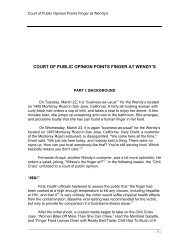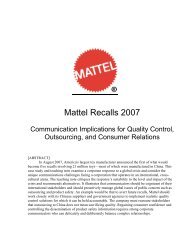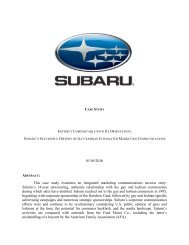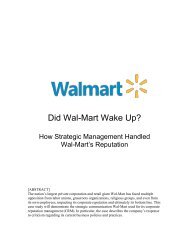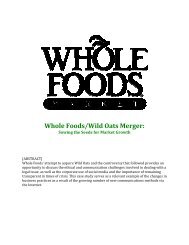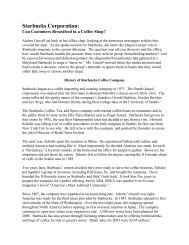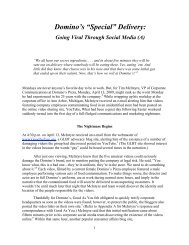McDonald - The Arthur Page Society
McDonald - The Arthur Page Society
McDonald - The Arthur Page Society
You also want an ePaper? Increase the reach of your titles
YUMPU automatically turns print PDFs into web optimized ePapers that Google loves.
demonisation of its core products over the past five years. You can spend millions on<br />
CSR [corporate social responsibility] and community work, but that counts for very little<br />
if burgers and fries remain 'evil' in the eyes of the public” (p. 15). 58<br />
2. <strong>The</strong> Issue of Fast Food, Nutrition, and Health<br />
<strong>The</strong> fast food sector has been right up there with the oil industry and tobacco<br />
companies as a target for negative press. 59 In 2003, Fortune magazine even ran a cover<br />
story asking, “Is fat the next tobacco? 60 Concerns about the nutritional content of fast<br />
food have risen in concert with rising obesity rates. 61 <strong>The</strong> Executive Summary of the<br />
“Calories Count: Report of the Working Group on Obesity” summarizes the problem: 62<br />
Since the late 1980s, adult obesity has steadily and substantially increased in the<br />
United States. Today, 64 percent of all Americans are overweight and over 30<br />
percent are obese; in 1988 through 1992, fewer than 56 percent were overweight<br />
and fewer than 23 percent of American adults were obese. <strong>The</strong> trends for children<br />
are even more worrisome. Recent research by the U.S. Centers for Disease<br />
Control and Prevention (CDC) shows that 15 percent of children and adolescents<br />
aged 6 to 19 are overweight--double the rate of two decades ago. As Americans<br />
get heavier, their health suffers. Overweight and obesity increase the risk for<br />
coronary heart disease, type 2 diabetes, and certain cancers. According to some<br />
estimates, at least 400,000 deaths each year may be attributed to obesity. 63<br />
While there is no single cause for obesity, or single solution to reduce its incidence in<br />
America, the FDA’s Working Group on Obesity suggests voluntary nutritional labeling at<br />
the point of sale for restaurant foods so that consumers can accurately assess the amount<br />
of calories and fat content. <strong>The</strong>y also advocate that restaurants replace saturated, or<br />
“trans” fats used in cooking oils with zero/mono and/or polyunsaturated fats, which do<br />
not raise “bad” cholesterol (low density lipoprotein, LDL) and even have health benefits<br />
when eaten in moderation. 64<br />
Fast food chains have long been targeted as providing “junk food” high in calories<br />
and trans fats, which thereby contribute to the growing problem of obesity and health<br />
15



